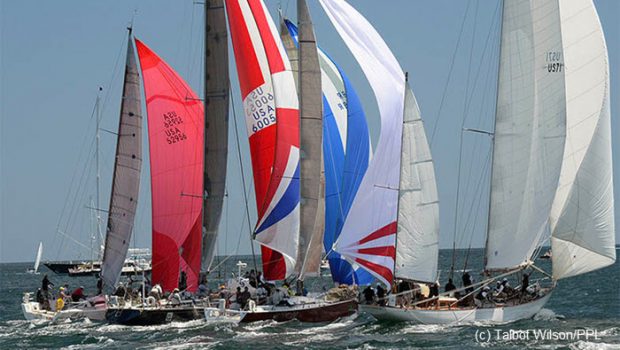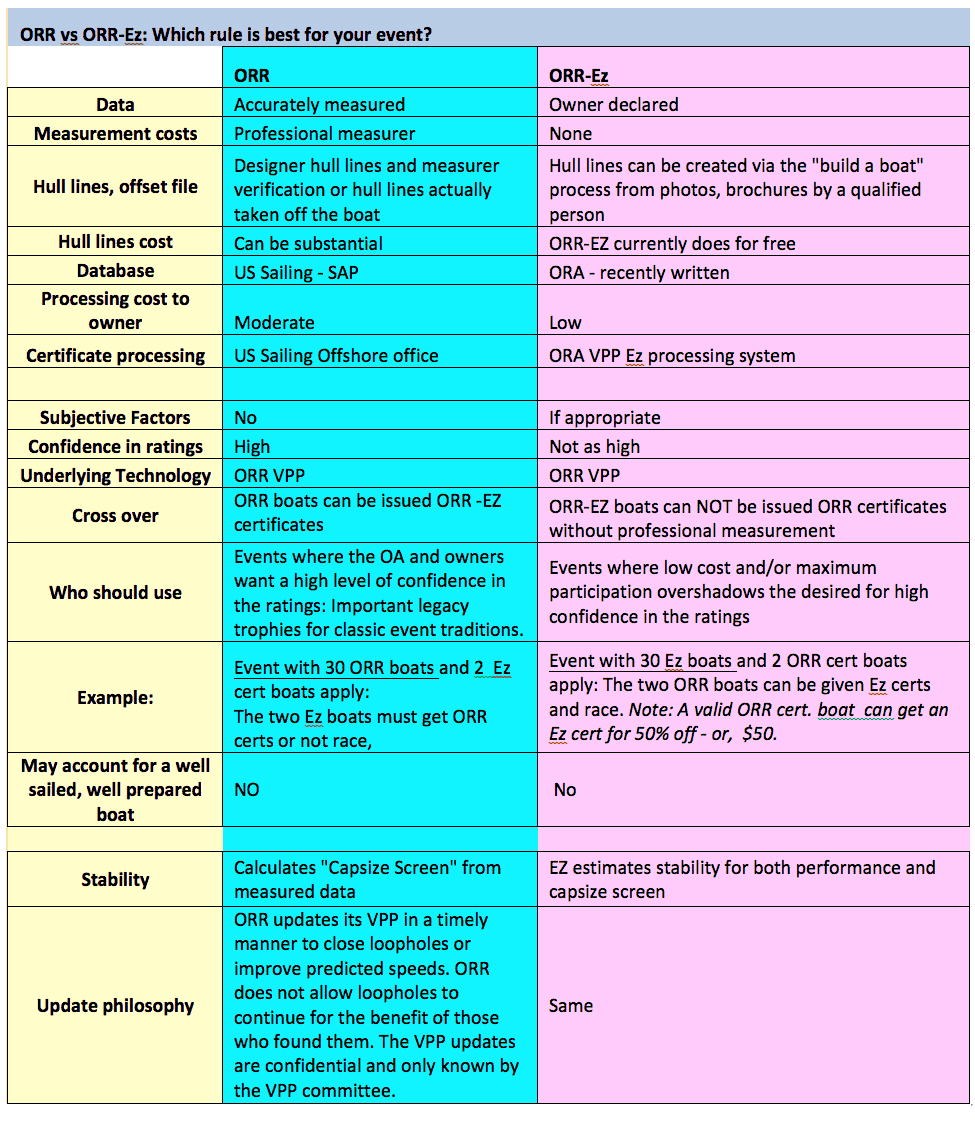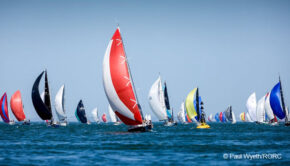Which handicap rule for your event
Published on March 11th, 2019
by Craig Leweck, Scuttlebutt
In my March 2017 column for Sailing World magazine, I addressed the contentious topic of how the USA has too many rating rules. No country needs PHRF, IRC, ORR, and ORC to serve the needs of its constituents, and I contend it has contributed to declining interest in handicap racing.
It didn’t used to be this way, but a lack of national leadership has led to splintering approaches to solving the same problem, and the economics of rule administration has yet to eliminate any of these competing options.
While PHRF is a locally administered subjective approach, the other three derive their ratings from measurement and formula. Whereas IRC has the simplest approach, the backers of ORR and ORC contend that accuracy only comes from complexity. As right as they arguably are, this complexity can be viewed as more obstacle than opportunity.
As a result, both ORR and ORC offer two versions of their rule (more splintering?), with these simpler options hoping to bridge the gap from bewilderment to bewonderment. For ORR it is ORR-Ez; for ORC it is ORC Club.
In this report by noted yacht designer Bill Lee, who is the Chairman for the ORR Technical Advisory Committee and is an ORA Board of Directors which administers ORR, he provides a guide for organizing authorities and race committees when choosing rating rules:
If you are responsible for organizing a sailboat race or regatta for boats of varying speeds and design, you need to use a handicapping rule to fairly score the racing. At the Offshore Racing Association, we’re commonly asked which of our two popular rules should be used – ORR or ORR-Ez? Let’s start by summarizing the rules.
What is ORR?
ORR is a measurement rule that accounts for various speed-affecting factors such as displacement, draft, stability, propeller drag, sail plan and sail inventory. All of these items are professionally measured. All are processed through the ORA’s Velocity Prediction Program (VPP), yielding predicted speeds and different ratings for different uses. The cost is higher, but there is much higher confidence in the ratings. ORR is a pure measurement rule and no subjective factors are allowed. Lastly, with professional data, rating protests are easier to resolve.
What is ORR-Ez?
ORR-Ez takes all of these same things into account, but allows lower-cost owner-declared measurements in place of professional measurements. For designs where designer lines are no longer available, the Ez team will approximate a hull shape. The same VPP is used. However, for ORR-Ez, if the predicted speeds appear either too fast or too slow, the ORR-Ez administrators may apply subjective factors to adjust the predicted speeds as needed. Because ORR-Ez allows owner-declared measurement, costs are much lower.
Which rule should we choose for our race?
The answer of course is, “It depends.” ORR is more accurate; ORR-Ez is more accessible. Here’s our best advice to organizing authorities considering the question:
If you manage a prestigious event with long-established trophies, our experience is that you should probably consider a measurement rule such as ORR. This is especially the case if competitors are likely to spend significant amounts on sails, boat prep, travel, crew expenses, etc, and where, the higher cost of a professionally measured ORR certificate is relatively small as a percentage of the entire event cost.
For sailing regattas and distance races where minimizing costs and maximizing entries are more important than the highest accuracy ratings, organizing authorities should consider a lower-cost “Owner Declared” data rule, such as ORR-Ez.
What other factors should be considered?
Leaders of race-organizing authorities should consider these guidelines as to what boats can race under each rule:
• Too many rules for a single event dilute the results, but trying to squeeze everyone into one rule sometimes doesn’t work either.
• Don’t let owners “cherry pick” rules that give them a better rating or easier competition.
• Consider dividing by speed range with the faster-rated boats in ORR and the slower-rated boats in ORR-Ez.
• Also, for a large number of entrants, consider assigning the sprit boats to one class and pole boats to another, even if not in perfect order of rating—whether under ORR or Ez. This is especially true for high-performance sprit boats with large downwind sail areas compared to the weight of the boats.
• Consider grouping by sailing styles. For instance, some classes can be more restrictive on professional crews. The Newport Bermuda Race does this in its ORR fleets.
• If you have too few entries to fill classes using both a measurement rule and an owner-declared rule, use the owner-declared rule like ORR-Ez.
Would PHRF be a better option than ORR-Ez?
PHRF handicaps are developed from a combination of long-term observed performance, overlay formulas for boat modifications, and the local PHRF handicapping board. This system has strong points, but with the modern science available on sailboat performance, a rule like ORR-Ez offers several advantages as a viable low-cost choice. Perhaps the chief value of PHRF is the familiarity competitors and race committees have with the system, and if the satisfaction level is high, there’s little point in making a shift.
ORR or ORR-Ez – Summary Review:
ORR should be considered for…
1. legacy events with long-term perpetual trophies;
2. events with a long history of quality competition;
3. events where the cost of professional measurement is a relatively small percentage of the total cost of preparing and competing in the event;
4. events where there is a desire to reduce errors in the ratings, either inadvertently, or in an extremely small number of cases, intentional;
5. events where entrant wants highest confidence in his rating and that of his competitors.
ORR-Ez should be considered for…
1. events in which maximum participation is most important and some rating inaccuracies can be tolerated;
2. inexpensive events to enter where the cost of measurement is not justified for the cost of participating in the event;
3. events where the participants are not willing to pay for the benefits of professional measurement;
4. events with not enough boats for two classes, in which case ORR-Ez is strongly recommended:
Additional considerations…
1. ORR-Ez certs boats cannot race with ORR certs boats.
2. ORR-Ez data is not sufficient to create an ORR certificate. However an ORR certificate can easily be adapted to an ORR-Ez certificate. (ORA will do this for $50.)
3. Offshore Racing Association considers ORR to be the preferred system for accuracy and only suggests ORR-Ez when cost is a controlling factor.
Source: Offshore Racing Association










 We’ll keep your information safe.
We’ll keep your information safe.